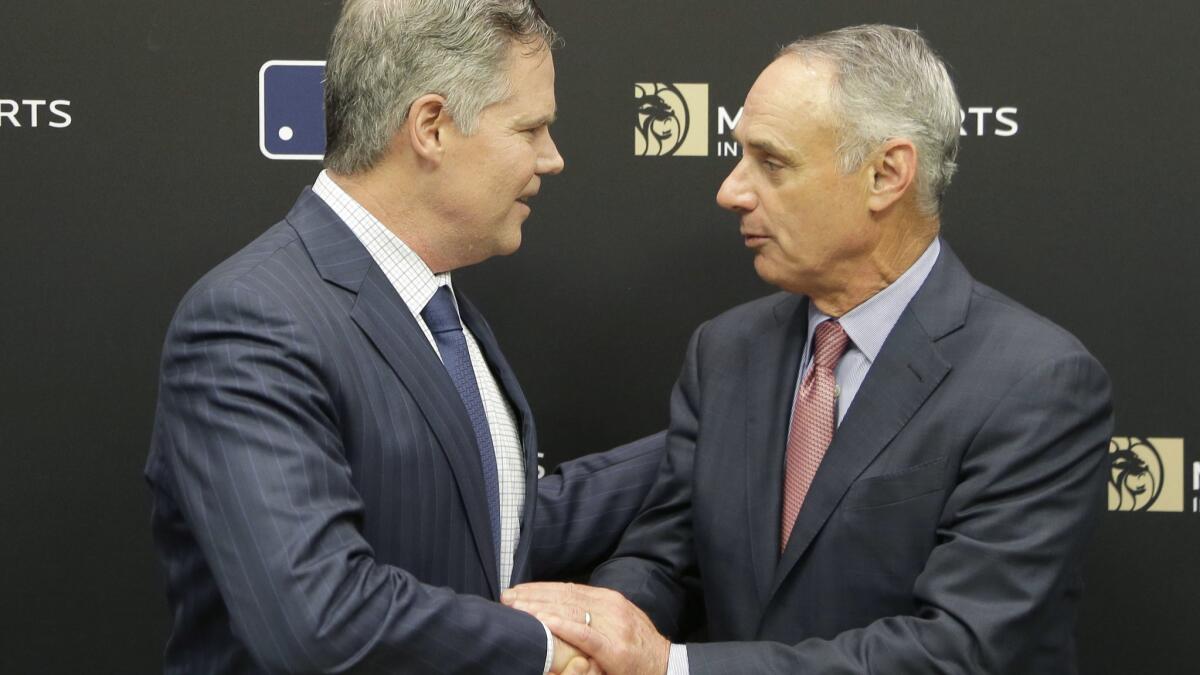MLB becomes third major sports league to form partnership with MGM

If you are a Major League Baseball player, you cannot bet on your sport’s games. But, now that states can legalize sports gaming, the league has accepted $80 million from a company that is betting it can lure fans to bet on these players’ games.
MGM Resorts is the first “official gaming partner of MLB,” the league announced Tuesday. The four-year deal identifies MGM as an “MLB-authorized gaming operator,” grants the company the right to use an official statistics feed and provides exclusive access to what the league called “enhanced statistics.”
For almost a century, baseball stood firm against gambling. Two of the game’s greatest players, Willie Mays and Mickey Mantle, were banned for years — in retirement — after making promotional appearances for casinos. Pete Rose, the game’s all-time hits leader, was banned for life after betting on baseball as a player and manager.
In 1921, the first commissioner banned eight players for life amid a gambling scandal. Commissioner Rob Manfred has refused to reinstate Rose, but Manfred has reinstated pitcher Jenrry Mejia, who was banned for life after three positive tests for the use of performance-enhancing drugs.
The league’s stand against gambling has slowly eroded. Many teams have struck sponsorship agreements with Native American tribes that run casinos, including the Dodgers with San Manuel, the Angels with Pechanga and the San Diego Padres with Sycuan. The league itself invested in Draft Kings, a daily fantasy game, in 2013 and later expanded the partnership to a sponsorship agreement.
In May, when the Supreme Court ruled that any state could offer sports betting, MLB and other leagues initially demanded a share of the proceeds. After sports books refused, the leagues settled on selling bookmakers the same kinds of partnerships and sponsorships offered to beer makers and car makers.
In the six months since the Supreme Court ruling, MGM has struck deals with the NBA, the NHL and now MLB. The terms of the MLB deal were disclosed to The Times by a person familiar with the deal but not authorized to discuss it publicly.
In a statement, the league said it would join with MGM on “comprehensive responsible gaming measures and work to protect the integrity of the game both on and off the field.”
Said Manfred: “Our partnership with MGM will help us navigate this evolving space responsibly, and we look forward to the fan engagement opportunities ahead.”
The league eventually could make an estimated $154 million per year in selling sponsorships, television advertising and statistics to gaming companies, according to a Nielsen study commissioned by the American Gaming Assn. and released last month.
The league could make another $952 million per year if what the AGA calls “widely available, legal, regulated sports betting” broadens the baseball audience and thus drives increases in ticket sales, merchandise sales, and broadcast rights fees.
Sports betting currently is legal in a handful of states: Delaware, Mississippi, New Jersey, New Mexico, Nevada, Pennsylvania, Rhode Island and West Virginia.
How broad that audience might be depends on how many fans are willing and able to bet on baseball games and, perhaps more importantly, how many might make prop bets during a game, on a mobile phone or even at a ballpark betting window.
If betting becomes sufficiently popular, fans could bet not only on whether the Dodgers win but on whether Justin Turner hits a home run, Clayton Kershaw strikes out 10 or Yasiel Puig wags his tongue during the game.
The gambling money is sure to attract attention from the players’ union, whose members see management revenues soaring at a time when even large-market teams are using the luxury-tax threshold as an unofficial salary cap.
Fox last week agreed to pay a reported $5.1 billion to keep national MLB broadcast rights from 2021 through 2028. By then, if the AGA estimates turn out to be realistic, every team could make $60 million per year from the Fox deal and gaming revenues, above and beyond what each team could make in ticket sales and local radio and cable television rights.
Follow Bill Shaikin on Twitter @BillShaikin
More to Read
Go beyond the scoreboard
Get the latest on L.A.'s teams in the daily Sports Report newsletter.
You may occasionally receive promotional content from the Los Angeles Times.











